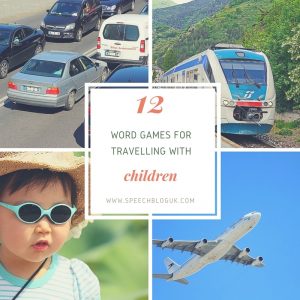It’s almost the end of the school year! We may be still waiting for the sun to come out in the UK, but lots of us are winding down for the end of term and getting ready to go away! Whether you are at home or away during the school summer break, you are likely to be travelling somewhere at some point. Keeping children entertained on the move is always a challenge – but it’s also a great time for conversation and to expand language skills in a fun way.
So today I’m going to share some of my favourite word games to play with children while travelling. Most of them are aimed at primary school aged children (5-11), but I have included ideas for making the easier or harder for children with varying levels of language skills.
- I Spy. OK, so you didn’t need any help to think of that one! Of course, the traditional version involves spelling or phonemes (I spy something beginning with s etc). You can also play other versions though. When my daughter was 3-4, and couldn’t yet play the traditional version of the game, we used to play this with colours (I spy something green for example) or categories (I spy something you can eat). For older children you could make the categories harder – EG I spy something soft or I spy something edible.
- 20 Questions. Choose a category (eg animals, famous people or things in the car). Each person takes a turn at choosing something which fits into the category. The other players have to take turns to ask questions to work out what it is. This is quite a difficult game and works on all sorts of skills – inferencing, auditory memory, vocabulary, asking questions etc. Make it easier by talking about the sorts of questions that might be good to ask before you start – eg for animals – where does it live? how many legs does it have? what colour is it? etc. Make it harder by only allowing questions with yes/no answers.
- I went to market. The first person says, “I went to market and I bought…” and then chooses an item. The next person repeats it and adds one to the list. Play continues until someone can’t remember all the items. You can vary the starting phrase to all sorts of different things. On the way home from a trip, we often do “when I went to x I saw…”. Make it easier by just asking the child to add to the list and not repeat back the other items that were said. Make it harder by using consecutive letters of the alphabet.
- Invent a story. Make up a story together. Each person in the car takes a turn to add a little bit to it. Make it easier by telling the story yourself and just asking your child to fill in the gap (eg “suddenly they saw a…”) Make it harder by doing one word each.
- Bingo. At its simplest level, this is great for really little ones. Who can be first to see a tree? A bus? A sheep? Make it harder by asking for a list of things, or more complicated things. You could look for things starting with each letter of the alphabet, or take turns to choose an attribute and look for things to fit it (eg who can see something spiky? Who can see something transparent?”)
- Buzz. Someone thinks of a word. Either one person tells a story or you can listen to the radio. Every time someone says the word you are listening for, you shout “Buzz”. You can make this harder by asking the child to listen for several different words and do different things. Alternatively, give each person in the car a different word to listen for.
- Simon Says. This one might be good at an airport or somewhere with a little more space, but with a bit of imagination, there are still plenty of instructions you can give in the car too. Ideas – clap, shout, stick out your tongue, make different animal sounds, close your eyes etc. NB The driver probably shouldn’t join in with this game!
- Draw a picture. This one is better for airports and train stations as it requires a pen and paper. Each person has a piece of paper. One person draws a picture and then tries to describe it for other people to draw the same thing. This is quite a difficult game and is great for a range of skills – listening, following instructions, position words, asking questions etc.
- Just a minute. Take turns to choose a topic, either for yourself or someone else. (If you have several children of different ages, pick suitable topics for each one). Each person has to talk about their topic for one minute without deviating from the subject. If they manage it, they win a point. If the others think they strayed too far from the topic, they don’t.
- Naming items. Choose a category. Take turns to name something in that category. Keep going until someone can’t think of any more. Topics can vary in their difficulty (eg animals or food for younger children or European countries or Shakespeare plays for teenagers).
- What could you do with… Choose a simple item. Take turns to think of an alternative use for it. EG a drink’s bottle could be a pen holder, a telescope, a trumpet etc.
- Planning your trip. If you’re going somewhere that your child knows well, see if they can remember the things they might do or see. If you’re going somewhere unfamiliar, they can guess. You can try this in categories – eg things we might do, people we might see, things we might eat etc.
Do you have any other favourite word games to share?







Leave a Reply